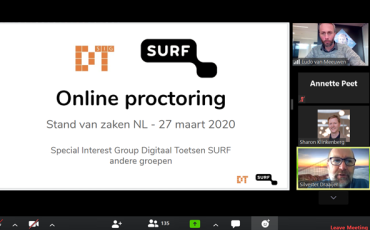Iris Huis in 't Veld
Waarde(n)vol en future-proof onderwijs. Daar draag ik graag mijn steentje… Meer over Iris Huis in 't Veld
Do you use Zoom to organise and run your online education? Below you’ll find a number of links on how to use Zoom as privacy-friendly as possible (NL / EN).
Due to the COVID-19 crisis, many parties are starting to use new tools for remote meetings or webinars. Many parties choose Zoom. This software is known for its quality. It rarely malfunctions and has a very user-friendly interface. The current crisis has certainly not done the American service provider any harm. But of course, European customers wonder: can you work with such an American service provider? And how do their privacy and security policies relate to the GDPR? ICT-Recht (IT Law) wrote this blog about it (in Dutch).
If you're using Zoom, it makes sense to look at the privacy issues from two perspectives. The first thing to understand is what information Zoom can collect, and what they do with this information. Then there's the information the meeting host collects and how this can be shared with other. This article will provide you with tips on how to protect yourself while using Zoom (English).
Zoom offers users a feature called “attention tracking.” According to the Zoom website the feature — which can be disabled if the chat administrator allows it — will track whether participants click away from the active Zoom window for more than 30 seconds. Read more about this feature in a Vice article here. The Zoom website also provides more information about this feature.
There are certain privacy issues with Zoom. Especially now Zoom is growing explosively due to the increased demand for remote-working tools, various digital and privacy watchdogs have analysed Zoom and written articles about it. Zoom offers hosts, admins, and Zoom extensive surveillance options that many unsuspecting Zoom users will not (always) be aware of. Therefore, here is an overview and what you can do with this knowledge as a user (in Dutch).
What does Zoom say about privacy and security? See the privacy statement and the security whitepaper of the organization.
Because higher education institutions are closed and employees, lecturers and researchers work from home, there is a great need to keep in touch with colleagues, students, and employees online. Video conferencing services (VC services) can help with this. What does SURF do? Read it here.
Do you know a useful article with tips on privacy-friendly use of Zoom that is not yet listed here? Let us know in the comments.
Waarde(n)vol en future-proof onderwijs. Daar draag ik graag mijn steentje… Meer over Iris Huis in 't Veld
Dit artikel heeft 3 reacties
Als lid van SURF Communities kun je in gesprek gaan met andere leden. Deel jouw eigen ervaringen, vertel iets vanuit je vakgebied of stel vragen.
I just checked this article:
https://www.bleepingcomputer.com/news/software/how-to-secure-your-zoom-…
This article includes a number of recommendations when using ZOOM:i.e.:
- Add a password to all meetings!
- Use waiting rooms
- Disable participant screen sharing
- Lock meetings when everyone has joined
- Do not post public links to your meetings
I just checked this article:
https://www.bleepingcomputer.com/news/software/how-to-secure-your-zoom-…
This article includes a number of recommendations when using ZOOM:i.e.:
- Add a password to all meetings!
- Use waiting rooms
- Disable participant screen sharing
- Lock meetings when everyone has joined
- Do not post public links to your meetings
If the institution has a Zoom subscription, logging in can be handled by SURFconext. Instructions on how to configure this are at https://wiki.surfnet.nl/display/surfconextdev/Zoom


3 Praat mee